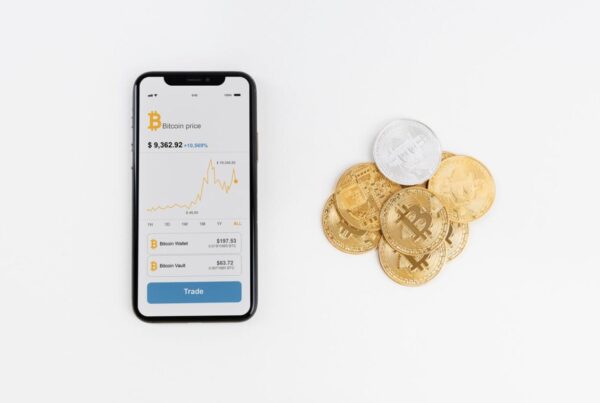Cryptocurrency transaction speed is an important consideration for crypto investors and traders.
This speed refers to how quickly a transaction can be confirmed by the network and is usually measured in minutes. Cryptocurrency transaction speed is important for two reasons:
- It tells you how quickly your transaction will be recorded by the network and become irreversible. The longer a transaction needs to wait for confirmation, the higher chance that somebody could spend those coins again before they are confirmed in an alternate blockchain fork (which would require the coin to be spent twice).
- It affects how quickly you can spend your coins. For example, if a digital wallet has to wait for confirmation before spending any funds from that address then this waiting time will affect its usability and limit trade-offs.
So, what changed since then? We will revisit how transactions are confirmed, how long the process of confirmation takes, the crypto with the fastest transaction time, and some of the factors that affect cryptocurrency transaction speed. Read on!
Defining Terms
Average transaction speed
The average transaction speed refers to the median transaction confirmation time. It is calculated by measuring a sample of transactions and taking their mean or average value. This provides a more accurate reflection of what people can expect to see in terms of speeds than simply looking at one or two individual cases.
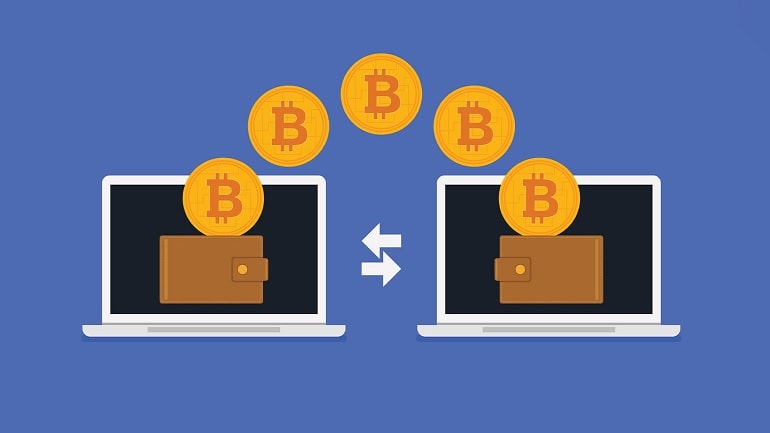
The opposite happens if there are fewer active users on the network – which means that confirmation times would be longer for any given transaction because fewer people are competing for space in blocks.
Actual transaction speed
The actual transaction speed in cryptocurrency is a measure of how quickly transactions are processed on the network.
Transactions are the fundamental unit of activity on any blockchain, and as such how quickly transactions can be processed is a key factor in determining how useful that given cryptocurrency will become.
| Cryptocurrency | Transactions per Second | Average Transaction Confirmation Time |
|---|---|---|
| Bitcoin | 3-7 | 60 min |
| Ethereum | 15-25 | 6 min |
| Ripple | 1500 | 4 s |
| Bitcoin Cash | 61 | 60 min |
| Stellar | 1000 | 2-5 s |
| Litecoin | 56 | 30 min |
| Monero | 4 | 30 min |
| IOTA | 1500 | 2min |
| Dash | 10-28 | 15 min |
A higher Actual transaction speed in cryptocurrency means that more transactions can be processed at once, which is important as the network becomes increasingly congested. This is because a slower Actual transaction speed in cryptocurrency means that transactions will be processed slowly and so the network may become overwhelmed if it receives too many new transactions at once. This can lead to unpredictable delays for users, which makes the system less useful as an everyday currency.
Theoretical Transaction Speed
Theoretical transaction speed refers to the maximum possible confirmation time of a cryptocurrency. It is calculated by dividing the number of transactions per second by one block’s worth of data and multiplying it with two (to account for buffering).

Limits on theoretical speeds include:
- The size limit: This is enforced because blocks cannot exceed one MB in size. If they do, then miners will refuse to continue adding new transactions into them until the overflow has been dealt with first. This means that any pending transactions will have to wait even longer than usual because they would have to be completed before the new transactions are added.
- The number of blocks mined per day: This is a natural limitation because, if there are more than one every ten minutes (the current average), then this means that mining for new blocks will take longer. It also has the side effect of making confirmation times slower as miners work through and confirm long chains of pending transactions from different pools or groups on alternating blocks.
- Transaction size limitations: This refers back to what we said earlier about how complex a transaction can be, which would affect the time that miners spend relaying information about it. Transactions with a higher number of inputs will take longer to process than those that have few inputs, for example.
- Memory pool size: If there are too many pending transactions in the memory pool (a place where miners queue up waiting for confirmation), then this would also affect how quickly they can be confirmed because all spaces would be used up.
- The number of memory pools: The more the number, then the longer it would take for miners to confirm transactions because they are competing with other people trying to get their transaction into blocks.
Claimed Actual Transaction Speed
Claimed transaction speeds are not the same as actual speed and refer to what is advertised or claimed by a given cryptocurrency’s developers. This may be higher or lower than their average speeds, but it reflects how fast they want users to see transactions processed at any given time.

Transaction confirmation time
Transaction confirmation time is how long it takes for a transaction to be confirmed by the network. This is another important consideration because it will affect how quickly you can spend your coins, where you are spending them from, and with what amount of resources available at that moment.
Transactions per second (TPS)
The transactions-per-second metric measures how many transactions can be processed in a given second. This is an important metric to look at because it can be used to assess the network’s scalability, its security, and how well it will stand up against any potential competition.
Top 5 Cryptocurrencies That Have High Transaction Speed
Below are cryptos with the fastest cryptocurrency transaction speeds:
1. Bitcoin Transaction Speed
Bitcoin might not process the fastest crypto transactions, but it is a cryptocurrency we cannot ignore. it is the most popular cryptocurrency on the market right now.
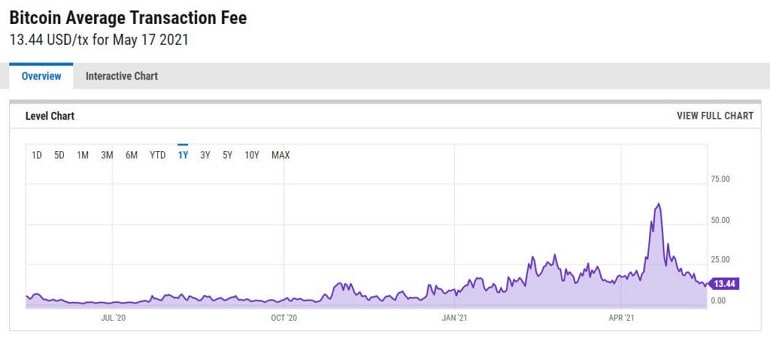
Credits: Ycharts.com
As we know, it is the largest crypto by market cap and is celebrated as the first decentralized digital currency. Bitcoin can process up to seven transactions per second and has a confirmation time of 15 minutes.
Find out the best Bitcoin trading platforms in 2023 here.
2. Ethereum Transaction Speed
We cannot talk about the transaction speed of cryptocurrency and fail to mention Ethereum. The Ethereum blockchain can process up to 20 transactions per second and this increases as more users start using it for mining blocks. It has a confirmation time of 5 minutes.
Theoretically, there are no limits on how many transactions could be processed in one block because they aren’t constrained by size or time like those found with Bitcoin-based currencies (due to their hard limit).
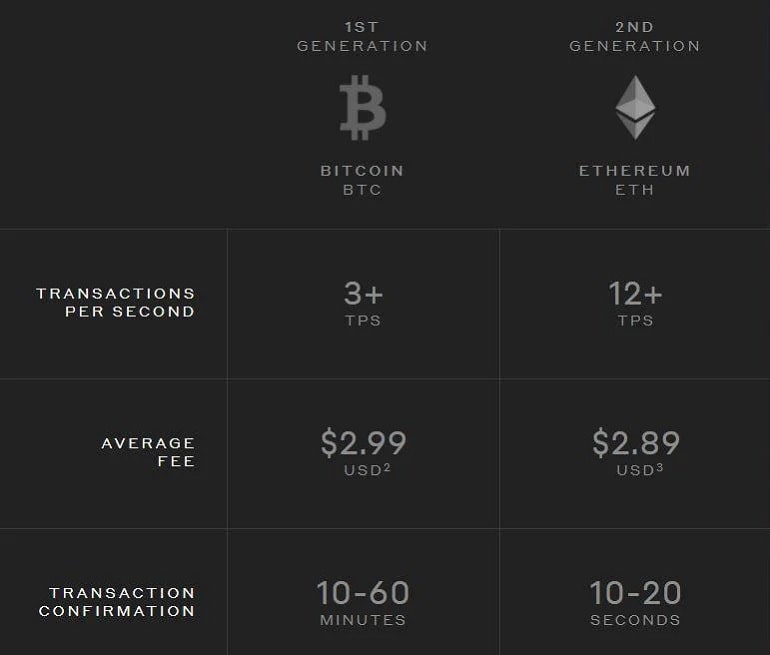
It’s worth mentioning that Ethereum transaction speed is one of the fastest cryptocurrency transaction speeds on the market.
To find out more differences between Ethereum and Bitcoin click here.
3. EOS Transaction Speed
EOS is a blockchain-based, decentralized operating system that also has its own cryptocurrency. The goal of the platform is to become better, faster, and more scalable than other digital currencies in the market.
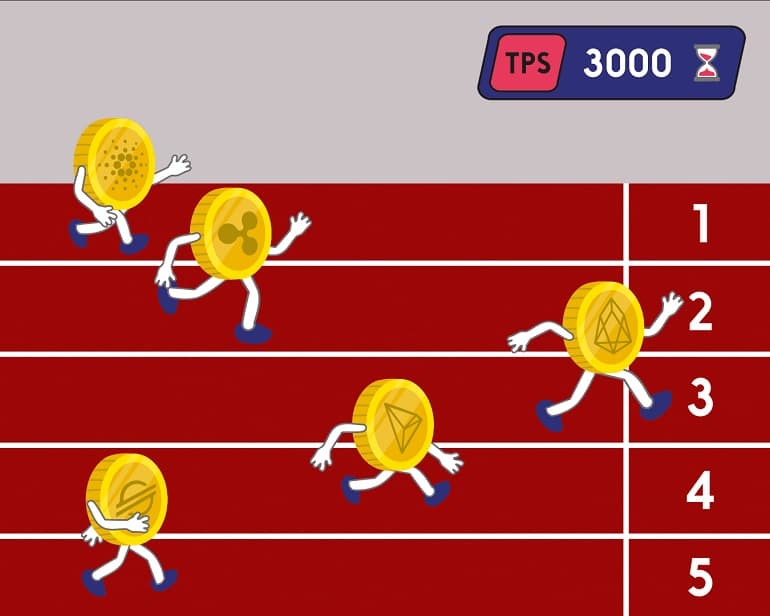
Credits: Oobit.com
The EOS crypto can process up to 2800 transactions per second and have a confirmation time of 0.5 seconds. It has one of the fastest cryptocurrency transaction speeds because it doesn’t rely on older consensus protocols like Proof-of-Work (PoW).
Instead, they are built off Delegated Proof-of-Stake (DPoS). This makes them much more scalable than other cryptocurrencies as it means there’s no need for every node in the network processing blocks at any given time.
4. NEO Transaction Speed
NEO is an open-source, blockchain-based cryptocurrency and a smart contract platform. NEO is also known as the Chinese Ethereum because of its speed and use cases.
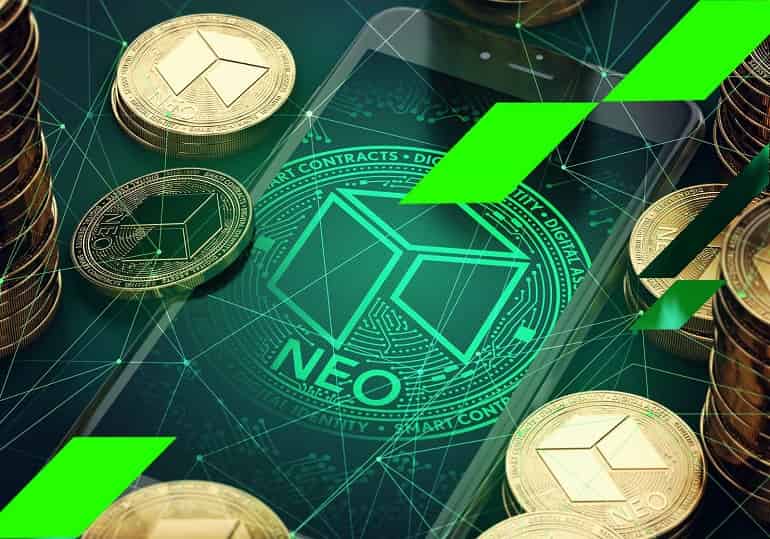
5. Ripple Transaction Speed
Ripple was introduced to the crypto market in 2012 and its goal is to offer a global settlement network. This cryptocurrency has a unique transaction protocol that has been designed for institutions. The Ripple Network is capable of handling up to 1500 transactions per second.
It has a confirmation time of 3-5 seconds, making it one of the fastest cryptocurrencies in terms of transaction speed. It is also one of the fastest at settling payments, according to Ripple itself.
If you want to find out about other cryptocurrencies and their transaction speed, check out article about the best cryptos to invest.
What Determines Cryptocurrency Transaction Speed?

Network load
Network load is the amount of traffic the network has received over a given period. It is one of the biggest factors that affect how long a transaction takes.
The more traffic there is in any given time frame, the slower your transactions will take place for confirmation. Conversely, if there’s less traffic then it takes significantly less time for processing transactions.
Lighting Network
The Lighting Network is a Poon-Dryja payment channel that allows for transactions between nodes in the network. It does this by leveraging smart contract functionality to reduce the need for on-chain transactions which are often slow and expensive when compared to off-chain payments.
The Lightning Network is dependent on the underlying technology of the blockchain network. Because of this, it has a lower transaction limit. It can process thousands of transactions per second, with confirmation times at under one second (fastest cryptocurrency transaction speeds) and no fees involved. It comes with a wide range of benefits, including:
- Instant payments: Users can make transactions without waiting for a confirmation as it happens in real-time.
- Low cost: Users do not need to pay any transaction costs and instead, only exchange Bitcoin when opening and closing channels between nodes.
- Decentralization: Transactions happen independently from one another with no intermediaries needed in order to execute them, making this protocol more reliable than those built by large corporations like Visa.
- Faster transactions speeds: The Lighting Network is capable of processing thousands of transactions per second with just under one-second confirmation time which makes it faster than other crypto solutions out there.
- Scalability: The Lightning Network is built to be scalable and it only requires an average of three channels per node. This means that the majority of transactions will happen off-chain, which improves scalability while reducing the need for expensive on-chain transactions.
Other factors affecting cryptocurrency transaction speed include:
Network size
The larger the network is, and the more developed it has become over its lifetime (ie: Bitcoin), then typically it will have slower transaction speeds because there are fewer miners available to process blocks.
 Block Size
Block Size
Block size is defined as the amount of data that can be processed by nodes. The block size is the easiest way to increase or decrease transaction speeds on a blockchain. If a block’s size increases, then it means more transactions will fit into one single block.
This decrease wait time between new blocks being mined and their inclusion in the chain – making for faster processing times.
Mining Difficulty
Mining difficulty refers to how difficult miners must work before they find a valid hash value. As this number rises, it slows down mining because there are fewer available hashes per second meaning each individual miner spends longer trying to find an answer (it makes sense when you think about finding solutions in math problems). Miners may spend more time on the same calculations which could slow down transaction speeds.
Factors Affecting Confirmation Time
Just like cryptocurrency transaction speed, transaction confirmation time is affected by several factors, including:
The Complexity of a Transaction
Transactions with a higher number of inputs will take longer to process than those that have few inputs. It might also be more difficult for miners to confirm transactions in blocks when they are competing against others from different pools or groups.
Transaction Fees Paid
How much money was paid as a transaction fee will affect how quickly it gets confirmed by miners because they are competing with other people trying to get their transactions into blocks.
The Network’s Hash Rate
The higher the number of people mining, then this would make it more difficult for somebody to successfully mine a block and get their transactions confirmed.
How Often Blocks Are Being Mined

Credits: news.bitcoin.com
This is another factor that affects how long it takes for any given transaction confirmation because if there aren’t many new blocks created by miners at any given time, then the competition among transactions would be much higher.
Key Takeaways
- EOS has the fastest transaction speed in 2023 (0.5 seconds)
- Ripple (XRP) has the fastest payment settlement time (4 seconds)
- Transaction speeds depend on multiple factors: network load, how often blocks are mined, complexity of the transaction, etc.
- Cryptocurrencies are actively trying to shorten the transaction speed, so you can expect the transactions to be immediate in the future.
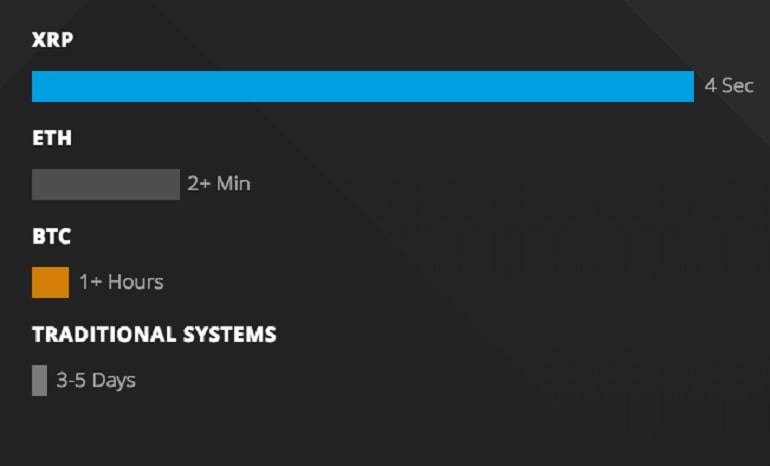
Source: Ripple
Final Thoughts
In conclusion, it is evident that cryptocurrency transaction speeds vary wildly with some being able to process transactions quicker or faster, while others struggle at all times even when their blocks happen fast enough on paper and their claimed actual transaction speeds are insanely high.
Ensuring that you have done your research before choosing one crypto over another will help you avoid making costly mistakes.
As always, if you want to trade cryptocurrency quickly and also chat with your friends and acquaintances in a fully encrypted text messaging app download Tezro. Have the best of both worlds and don’t worry about changing apps nonstop when you can have everything in one.

 Block Size
Block Size








